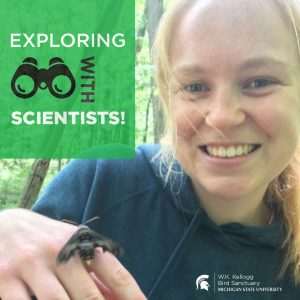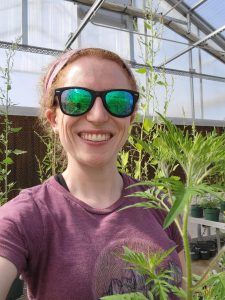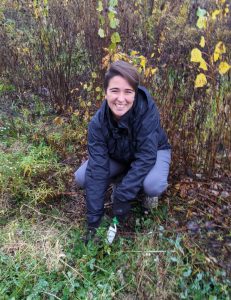Meet the team that will work together over the next year to develop programs like the KBS K-12 Partnership, Exploring with Scientists and more! The focus of the W.K. Kellogg Biological Station Science Education and Outreach Fellows is to share science in meaningful ways with K-12 educators, students and families. Read on to meet Robin and Isabela, the 2023 fellows, and learn about their research interests.
Alice Puchalsky
I am a fourth year PhD student in Nick Haddad’s lab at the Kellogg Biological Station. Broadly, I study how human activities affect insect biodiversity and the services that insects provide to us. Insects are crucial to our ecosystems and they provide us with many benefits including pollination, pest control, and decomposition. Not only are insects important, but their megadiverse ways of living life make them fun and interesting to learn about. I’m really excited to join the KBS outreach team and develop more insect content!
In my research, I focus on butterflies, moths, wasps, flies and bees. Fun fact: my favorite insect is the lettered habrosyne moth because of its crazy, squiggle wing patterning. In one of my projects, I am assessing how conservation corridors– which are corridors of habitat that connect two otherwise unconnected patches of habitat– affect moth biodiversity. My other two PhD projects focus on how agriculture, particularly strips of prairie inserted into crop fields, affects insects. In one project, I am determining how having prairie strips in a field affects the number and diversity of interactions between caterpillars (which are sometimes crop pests) and their parasitoids. This project has two aims– to determine if introducing prairie strips might boost pest control services by parasitoids and to determine if prairie strips might foster a greater diversity of interactions (interaction diversity is one aspect of biodiversity) between caterpillars and parasitoids. In my other agriculture-focused project, I am looking at how the introduction of prairie strips affects pollinators. In general, the aim of my research is to find ways to tweak our human activities, like agriculture and land management, so that they promote insect conservation.
I didn’t always love insects, and various educational and outreach experiences helped me to overcome my fear. I know first-hand how impactful science education and outreach can be, so I am very happy to be able to provide those sorts of experiences for others through this fellowship (check out my ‘mothing from home video tutorial’). Previously, I have been involved in KBS Outreach work as a presenter for the Exploring with Scientists and Blending Art and Science programs. As I delve into my time as a fellow, I am looking forward to doing more outreach and education work focused on art and science, insects, and in-person field trips at the W.K. Kellogg Bird Sanctuary.
Robin Waterman
After a great first semester learning the ropes, I am excited to return for another semester as a KBS Science Education and Outreach Fellow, and hit the ground running!
I am a third-year Ph.D. student in the Conner Lab at MSU’s Kellogg Biological Station. I am broadly interested in how organisms adapt to new environments. The two primary routes that populations can take to achieve adaptation are evolved genetic change across generations (termed “local adaptation”) and trait changes in response to the environment within a generation (termed “phenotypic plasticity”). I study both routes to adaptation in my research, using annual agricultural weeds as model systems.
Specifically, my main project will combine field, greenhouse, and genomic data from three native annual weeds to examine traits that enable such plants to invade crop fields. I also have a project investigating how floral traits in wild radish affect interactions with pollinators and the resultant impacts on plant reproductive success.
During my spring 2022 outreach fellowship, I was able to improve my science communication skills with teacher and student audiences through online educational series, field trips, and teacher professional-development workshops. I now have the pleasure of joining the outreach team for a full year, which will allow me to build on my prior work and gain new experiences. I am particularly interested in building useful and inclusive content for teaching evolution at the K-12 level. I would also like to gain experience engaging with local farmers.
Twitter: @RobinWEcoEvo
Email: waterm29@msu.edu
Isabela Lima Borges
I am a Brazilian Ph.D. student in the Fitzpatrick Lab at Kellogg Biological Station, studying the ecology and evolution of small populations. I study both plants and animals, locally at KBS and internationally in central Brazil. Small populations arise when human impacts on the environment cause species to decline or get fragmented across space, and studying them is vital to our understanding of how and why some species go extinct and others are able to persist.
I am particularly interested in the conservation of plants in tropical biodiversity hotspots such as Brazil, since many of the worst effects of climate change are predicted to affect those places. I decided to come to the U.S. for my graduate studies because of the abundance of resources available for research here that would have been more difficult to get back home, such as funds, field sites, and lab access.
My Ph.D. research is focused on how individuals in small populations interact with one another and with other species in their environments. In the wild, small populations are often very sensitive to disturbances and are sometimes protected by law, making it difficult to do experiments directly on these organisms. One common way to bypass these limitations is to study “model” small populations, which are plants or animals that are not actually endangered in the wild, but which do occur in fragmented distributions. By using them in the lab or greenhouse, as I do, scientists are able to learn more about small populations in general.
For example, in my Ph.D. I study a fish, the Trinidadian guppy (Poecilia reticulata), and a plant, the partridge pea (Chamaecrista fasciculata), that are fairly common in their natural environments and sometimes even invasive. However, this guppy and pea live in small streams and small prairie fragments, respectively, such that they mimic species of conservation concern that live in extremely degraded and fragmented habitats.
By observing how species like this interact with one another and other organisms, we can better understand the dynamics of endangered species in the field. This work is very important to complement direct observations of endangered species, which still need to be monitored out in the wild. Another part of my dissertation is an observational study of Brazilian plants that are potentially endangered and harder to study directly through experiments.
Given the focus of my work and my own personal background, I am focused on outreach based on environmental justice and conservation. Environmental justice is the idea that all people, regardless of nationality, race, or socioeconomic background, have the right to access and enjoy nature. Though everyone has the obligation to protect the Earth, different people have more or less responsibility for the damage that has been inflicted on the planet so far. Importantly, many of the places that are the least responsible for climate change are the most vulnerable to it––and a lot of them are important tropical biodiversity hotspots!
In order to protect the environment and endangered species, we must all understand what drives their declines and what can be done to reverse the damage, and it’s important to do so in a way that is internationally collaborative and prioritizes the areas and species that need it the most. I am excited to establish relationships with community groups around KBS, to communicate my research to broader audiences, and to learn from teachers and classrooms about what scientists can do to better inform and inspire the next generation to protect the planet.
About the fellows program
The Science Education and Outreach Fellowships are funded by the MSU Graduate School in order to support KBS-affiliated graduate students in building science communication skills for broad audiences. Misty Klotz, KBS community outreach coordinator, and Kara Haas, KBS LTER K-12 Partnership coordinator are co-mentors to this experience.
More information
Are you a teacher interested in the K-12 Partnership? Send us an email.
Are you a KBS graduate student interested in this program? Find more information here.



A legacy of conservation; a commitment to sustainability.
3700 E. Gull Lake Drive
Hickory Corners, MI 49060
(269) 671-5117
info@kbs.msu.edu